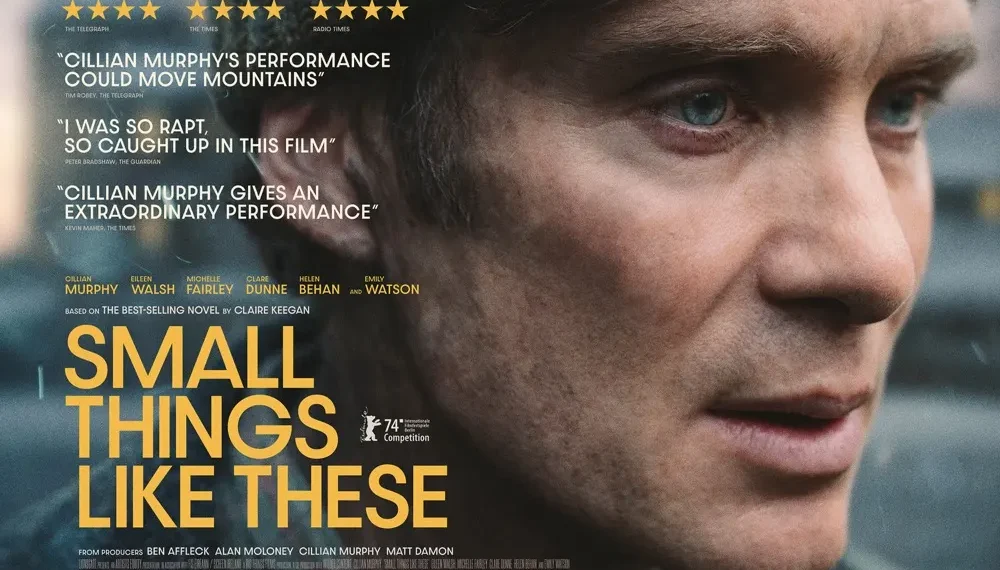Reviewed on February 14th at the 2024 Berlin International Film Festival – Competition. 98 Mins
Cast: Cillian Murphy, Eileen Walsh, Michelle Fairley, Clare Dunne, Helen Behan, Emily Watson
Genre: Drama, History
Director: Tim Mielants
In Irish Cinemas: 1st November 2024
Set in the weeks leading up to Christmas in 1985, in a quiet, close-knit town in County Wexford, Ireland, Bill Furlong (portrayed by Cillian Murphy) works tirelessly as a coal merchant to provide for his family—his wife and their five young daughters. His life is a steady routine of long days and hard work, typical of a man striving to secure a modest living in a town steeped in tradition and deeply influenced by the Catholic Church. However, while delivering coal to the local convent one cold morning, Bill stumbles upon a shocking and unexpected discovery. What he uncovers not only forces him to reckon with the dark realities hidden within the convent’s walls but also compels him to confront the town’s collective silence and complicity in disregarding the injustices taking place. As he grapples with his past and the moral weight of what he’s found, Bill faces difficult choices that will shape his future and challenge the Church’s powerful influence over the community. Adapted from Claire Keegan’s acclaimed novel, this story weaves themes of moral courage, personal responsibility, and the heavy burden of silence in the face of institutional wrongdoing.
Cillian’s performance in this role is a stark departure from his nuanced portrayal as the quiet yet commanding lead in Oppenheimer, where a subtle arrogance rubbed against many of his colleagues. In contrast, Bill (Murphy) is a man of quiet restraint and deep moral integrity who seems to have spent much of his life trying to make himself small and unobtrusive. Murphy brings this character to life through pregnant pauses and gestures that speak volumes, with his pale, expressive eyes revealing layers of unspoken pain and trauma suddenly reawakened by a jarring event. His portrayal is rich in emotional depth, with every silence and glance hinting at a troubled past just beneath the surface.
Acclaimed Belgian director Tim Mielants, who had previously collaborated with Cillian Murphy on Peaky Blinders, teams up once again with the actor for this project. Screenwriter Enda Walsh, a long-time creative partner of Murphy, also brings his seasoned expertise to the table. Walsh and Murphy’s working relationship spans over two decades, including numerous theatre productions, where they explored more experimental and abstract storytelling styles. In contrast, Small Things Like These takes a more understated approach. It’s a quietly powerful film, offering subtle emotional depth and intimate moments that unfold without any trace of sentimentality. Its restraint allows for a deeply resonant experience, where the emotions build gradually but leave a lasting impact.
The Magdalene Laundries, also known as asylums, were institutions that began operating in the late 18th century. However, what makes this dark chapter of history particularly disturbing is not just their existence but the fact that they were allowed to persist for so long, mainly due to the silence and complicity of a society heavily influenced by the Catholic Church. From the founding of the Irish Free State in 1922 until the closure of the last laundry in 1996, it is estimated that more than 10,000 women were imprisoned in these institutions and subjected to harsh, unpaid labour. Many of these women were young, unmarried mothers who had their babies taken from them and placed for adoption, leaving them emotionally scarred and powerless. The systemic abuse and exploitation endured by these women were largely ignored, as both religious and societal authorities shielded the laundries for decades.
Early clues — Bill’s workers chat about a Barry McGuigan boxing match, while a Dexys Midnight Runners track plays softly in the background at the local pub — situate the story in the mid-1980s. However, much like the world of The Quiet Girl, the town of New Ross in County Wexford appears so untouched by time that it could easily be mistaken for a setting from 20 or even 30 years prior, Frank van den Eeden, a frequent collaborator with director Mielants, captures the narrow streets and modest homes in muted shades of grey and brown, nearly evoking the sepia tones of old photographs. When the film flashes back to Bill’s childhood, these moments take on the appearance of hand-tinted vintage photos, enhancing the sense of timelessness and adding rich texture to the setting.

It’s the days leading up to Christmas in 1985, and Bill is busy making coal and fuel deliveries to families and businesses throughout the town. He returns home exhausted each night, washing the black dust from his hands and fingernails before sitting down to dinner with his family. The kitchen is filled with his daughters’ lively, affectionate squabbling, and despite his weariness, Bill listens to them attentively. With just a glance or a few words, it’s clear that love runs deep in their household, reinforced by the quiet presence of Bill’s supportive wife, Eileen (Eileen Walsh). One of Bill’s deliveries takes him to the Good Shepherd Convent, which sits just on the other side of the wall from the high school attended by his bright eldest daughter, Kathleen (Liaden Dunlea). There, Bill is deeply unsettled by what he witnesses. Standing partially concealed in the darkened doorway of the coal shed, he observes a heart-wrenching scene: a distressed young woman pleading desperately with her mother, struggling to resist, before being forcibly handed over to the nuns. The encounter leaves Bill shaken, hinting at deeper emotional undercurrents that may soon surface.
On the same day, Bill has a brief but poignant encounter with the timid young son of the town’s alcoholic, deepening his sense of vulnerability. Later, when he mentions at home that he gave the boy some loose change, his wife, Eileen, teases him for being too soft-hearted. This seemingly small moment foreshadows a later exchange when his practical and no-nonsense wife advises him, “If you want to get on in this life, there are things you have to ignore,” underscoring her pragmatic view of the world. Nora-Jane Noone, known for her role in The Magdalene Sisters, shines as Eileen in the film’s quieter, more intimate scenes. She portrays a woman who is visibly torn between her genuine concern for Bill and her anxiety that his public criticisms of the Church could draw unwanted attention or social disapproval within their tight-knit community. The “small things” referenced in the title represent the seemingly minor incidents that gradually unravel Bill’s fragile emotional state, pulling him into the deep sadness he has carried for much of his life. His melancholy, which never fully healed, only remained suppressed. Through childhood flashbacks, Louis Kirwan portrays a young Bill with heartbreaking vulnerability, showing the lasting impact of the bullying he endured as a child born out of wedlock. The trauma is conveyed not through the bullying itself but through the silent anguish on his mother Sarah’s (Agnes O’Casey) face as she scrubs his jacket, attempting to remove the remnants of spit and filth thrown at him. Sarah’s early death left Bill in the loving care of Mrs Wilson (Michelle Fairley), a well-off widow who took them in, and her farmhand Ned (Mark McKenna), who became both a father figure and a close friend to Bill in his formative years. This makes the warmth of his childhood memories bittersweet, as they only deepen the sense of loss and abandonment that haunts him in adulthood.

Enda Walsh’s screenplay masterfully uses dialogue sparingly, allowing the audience to understand Bill’s internal turmoil without anything needing to be explicitly stated. As Bill reflects on how easily he and his mother could have met a worse fate, his anxiety about his daughters grows. Eileen, ever watchful, notices the shift in Bill’s demeanour—his deepening melancholia and restless nights. When she questions him, Bill dismisses her concerns, attributing it to exhaustion or the onset of a cold. However, Bill’s mounting anxiety becomes undeniable during a visit to the local convent, where he’s there to collect payment on an invoice. He encounters the teenage girl he had seen earlier, Sarah (Zara Devlin), scrubbing the floor on her hands and knees. In a moment of desperation, she throws herself at him, tearfully begging for a ride to the river—anywhere to escape the convent. Staying faithful to Claire Keegan’s novella, Small Things Like These, is not primarily about the Magdalene Laundries (similarly featured in Stephen Frears’ Philomena). Instead, the story focuses on the corrosive effects of shame and institutional abuse, hidden in plain sight. Bill grapples with his conscience, torn between the moral imperative to act and the widespread silence in New Ross, where the townspeople prefer to look the other way. This silent collaboration is embodied in Mrs. Kehoe (Helen Behan), who runs the local pub. She pulls Bill aside and warns him not to cross the nuns, who significantly influence the town’s affairs. Without ever being heavy-handed, the story presents acquiescence as a slow, insidious force—a societal cancer eating away at the community’s moral fabric.
The film’s dramatic high point unfolds in a powerful scene where Bill discovers Sarah, frightened and trembling, in the coal shed and escorts her inside the convent. Once there, he is summoned — or perhaps commanded — to sit by the fireplace and share a cup of tea in the office of the Mother Superior, Sister Mary. Emily Watson portrays Sister Mary with remarkable nuance, embodying a woman of faith who has made peace with the moral compromises required to sustain a profitable laundry business built on indentured labour. Her seemingly caring gestures toward Sarah, like her polite conversations with Bill about his business and family, only thinly mask the intimidation that needs no verbal expression. As she finalises Bill’s account, Sister Mary calmly takes out a Christmas card, addressing it to Eileen. Inside, she slips cash, ostensibly a holiday gift, but it’s unmistakably hush money, part of a transaction meant to silence and control. Watson turns Sister Mary into a deeply unsettling figure, her polite facade barely concealing a steely resolve that is quietly chilling. This role is a crucial supporting part, and Watson plays it with a subtle menace that makes her all the more terrifying. Director Mielants, skillfully navigates the material with a steady, confident touch. He draws out the film’s emotional depth organically, never allowing the horrors of the Good Shepherd convent to become overt or exploitative. Instead, he chooses to leave the worst of the abuse offscreen, an understated approach that mirrors the restrained quality of Senjan Jansen’s delicate score. Mielants frequently frames the action through doorways, visually emphasising the burden of secrecy that weighs heavily on the story. Cillian Murphy, who also serves as a producer alongside his Oppenheimer co-star Matt Damon, leads the film with aching sensitivity. His performance anchors a sombre, deliberately paced drama that takes inspiration from the subdued tone suggested by its title. The narrative avoids conventional climactic moments, opting for a quiet, lingering conclusion that leaves an indelible emotional impact. By ending the film at a point where other stories might continue to build tension, the filmmakers achieve a powerful effect, allowing the film’s emotional weight to resonate long after the final scene.
Overall: 8/10


















